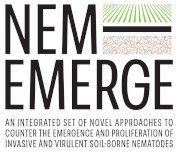Global warming is behind the northward expansion of nematodes historically classified as tropical species, with new root-knot nematode and potato cyst nematode problems documented in Europe and beyond.
In addition, potato and tomato plant varieties with natural (host) resistance to these nematodes have been widely used by growers to naturally protect their crops from the nematode threat. This resistance is conferred on plants by a specific gene encoding a protein that activates the plant’s immune response in the presence of harmful nematodes. However, this protein is temperature-sensitive and becomes inactive at elevated ambient temperatures (above 28ºC). The increasing incidence of heat waves in southern Europe therefore threatens the effectiveness of this measure to control nematodes.
What is NEM-EMERGE doing to tackle these challenges?
1. Determine the current proliferation and future expansion range of harmful nematodes in Europe and beyond. Where exactly do RKN and PCN currently occur? Due to the limited mobility of nematodes, range-expanding and invasive plant-parasitic nematodes have not yet invaded all areas with climate conditions suitable for their establishment. NEM-EMERGE aims to fill the current gap of knowledge about the current distribution and the potential area where these plant parasites could be established.
Firstly, molecular assays for the detection of some range-expanding nematodes will be developed into a standardized and validated detection kit. Secondly, NEM-EMERGE is taking soil samples approximately every 200-300 kilometres from southern Turkey and Spain to northern Germany to look for the presence of these plant-parasitic nematodes. The resulting picture will be used to geographically map the current and future spread of nematodes, enabling the development of an early warning system for the expanding species, including the determination of eco-physiological parameters for invasive and range-expanding nematodes.
2. Nullify the inactivation of host plant resistances under elevated soil temperatures. Host plant resistance is an effective and sustainable way to control pests and diseases, and this especially holds for plant-parasitic nematodes which have limited mobility and a relatively low number of generations per year. However, the effectiveness of this resistance gene is undermined by an increased frequency of elevated temperatures during the growing season.
Regions responsible for heat instability will be identified and compared, and gene variants leading to heat-stable proteins selected. Therefore NEM-EMERGE research will result in potato and tomato plants with host resistance that is not inactivated at high temperatures. This will allow new varieties to be released onto the global market and used by growers around the world confronted with increasing soil temperatures.
